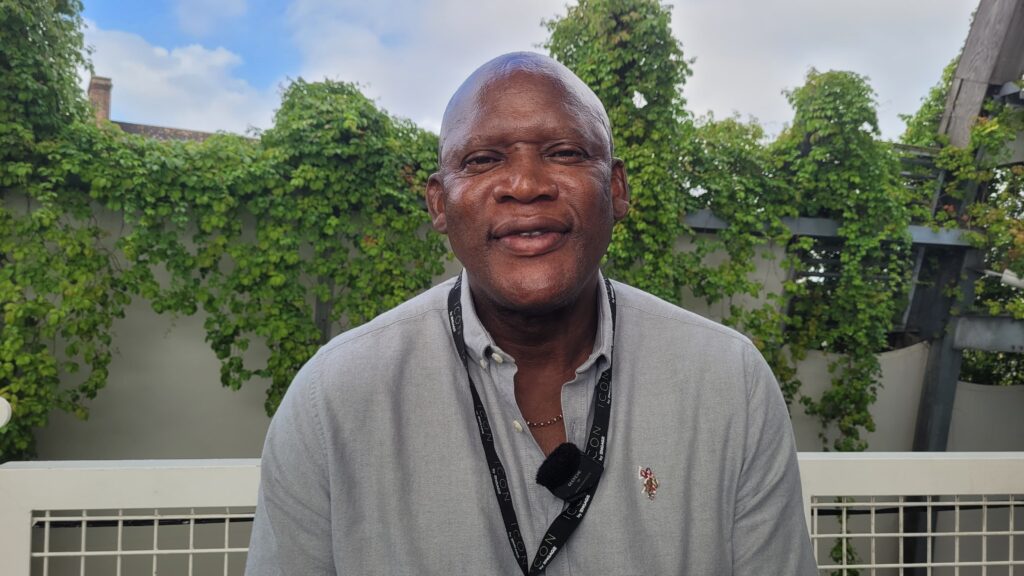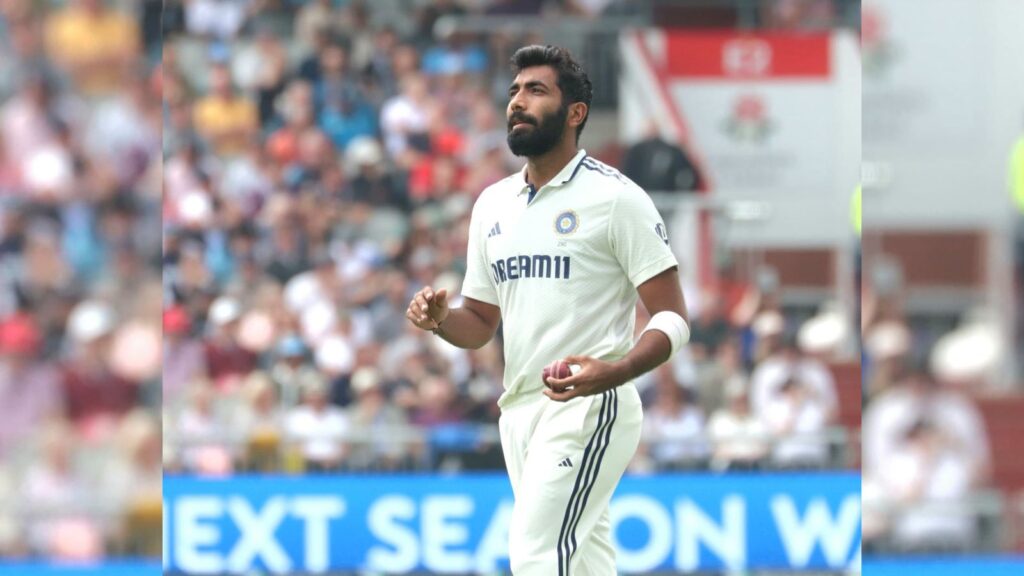
Debasis Sen in London
Former England fast bowler Devon Malcolm believes that Jasprit Bumrah’s absence is a significant blow to India, especially on a pitch like The Oval. Malcolm, who currently works part-time with the England and Wales Cricket Board (ECB) as part of its Diverse Communities team—focusing on African Caribbean engagement—feels strongly that Bumrah will be remembered as one of the game’s all-time great fast bowlers.
Now 62, Malcolm was present at The Oval during the first two days of the fifth and final Test of the series. In an exclusive conversation with this correspondent, he shared his thoughts on a range of topics. Here are some key excerpts from the interview:
Q: Devon, how tough was it to relocate and settle in Sheffield as a 16-year-old?
Devon Malcolm: Yeah, it was a bit of a culture shock, actually. I’d been living in Jamaica until I was 15, and then moved to Sheffield to join my dad. As you can imagine, it was a completely different environment. Coming from a bright, sunny island with beaches and that relaxed Caribbean atmosphere to an industrial city like Sheffield—it was a big adjustment. I remember the chimneys, the steel industry, the bell-ringing smoke… it was a lot to take in. So, yes, it was difficult at first.
But there were good things as well. I knew there’d be more opportunities in England. So even though it was a shock, I felt optimistic about the future.
Q: You made your debut in the middle of an Ashes thrashing in 1989. Did that make things harder?
Devon Malcolm: Yes, definitely. That debut came during a real thrashing from Australia. It was right after the rebel tour, where many of the senior England players went to South Africa, and a bunch of us younger guys—me, Angus Fraser, Mike Atherton, Tim Curtis—were suddenly thrown into the deep end to fill the gap. By the time I made my debut at Trent Bridge, I think it was already the fourth Test, and Australia were two or three nil up. It was a tough place to jump in, going from first-class cricket at a small county like Derbyshire to a packed stadium and national TV coverage. A real baptism of fire.
Q: Steve Waugh was dismissed by you several times. Later, he went on to say – Australia were always amazed when England didn’t pick you. How do you react to such a compliment from one of the greats?
Devon Malcolm: It was a massive compliment—especially coming from someone like Steve Waugh. He didn’t give anything away on or off the field. I remember it well. It was the third new ball of the match, and I finally got my first wicket: Steve Waugh, caught by David Gower off my bowling.
I actually got him out twice that series—once LBW, once bowled. And to hear later that he and the Aussies couldn’t understand why I wasn’t picked more often—that meant a lot. It gave me confidence. Waugh was a world-class batsman. You couldn’t just run in without a plan—he’d punish you. I always looked forward to bowling at him.
Q: How emotional was it to go back to Jamaica and take five wickets at Sabina Park?
Devon Malcolm: Very emotional. That series in 1989–90 was my first time back in Jamaica since I’d moved to England. And to return representing my adopted country, playing at Sabina Park—it meant the world. The crowd gave me a lot of stick at first. But that all changed when I got Viv Richards out—LBW in the first innings, then bowled him in the second. Suddenly the crowd realised, “Okay, maybe this guy can really bowl.” After that, I was accepted again, even celebrated.
A lot of my old schoolteachers and classmates were in the stands that day. It was a special moment.
Q: Tell us about the iconic words – “You guys are history” – against South Africa, at this ground, in 1994. Was that your best spell?
Devon Malcolm: Statistically, yes. I’ve bowled quicker in other games—against Australia in Perth, for example—but that spell at The Oval was special. It was South Africa’s first tour back in England after apartheid, their first series in over 30 years. I’d been recalled for that final Test and was determined to make an impact. I got hit on the head by Fanie de Villiers, which fired me up even more. I told our coach that morning I was going to take five wickets—I ended up with nine. At the time, it was the sixth-best bowling performance in Test history—only Sir Richard Hadley had better figures among fast bowlers. He took 9 for 52; I took 9 for 57. I consider myself a “quick” bowler, and it’s nice those figures still stand.
Q: Would you say black cricketers were misunderstood or stereotyped in your day? You had several issues with England coaches at that time…
Devon Malcolm: I’d say the bigger issue was inconsistency in selection across the board, not just for black players. There were no central contracts. You might be in one Test, and dropped the next, without a proper run. Sure, as black players, we sometimes had to work harder to prove ourselves. Myself, Phil DeFreitas—we were in and out a lot. But even someone like David Gower, one of England’s finest, got dropped. It was tough to feel like part of the team when you didn’t know if you’d be playing the next match. That instability hurt performance and confidence.
Q: Looking back, do you think England got the best out of you?
Devon Malcolm: No, I don’t think they did. With the way the system worked back then, I never got a consistent run. Over nearly a decade, I played just 40 Tests. That’s not ideal for developing rhythm or confidence. If I’d played in today’s era, with central contracts and a clearer pathway, I believe I would’ve played more and performed even better.
Also Read: Mr dependable Gus Atkinson to take charge after Chris Woakes suffers shoulder injury
Q: What’s your view on Jasprit Bumrah?
Devon Malcolm: Bumrah is unbelievable. That short run-up, the wrist position, what he does with the ball—it’s incredible. I think he’ll go down as one of the greats. His record across formats is outstanding. If I were part of the India set-up, and had a Test this crucial, I would’ve tried to get him to play. He’s a massive miss on a pitch like The Oval’s.
Q: How big a factor could Archer be in the Ashes? Have you spoken to him?
Devon Malcolm: Yes, absolutely. I’ve spoken to Jofra recently—we had an African-Caribbean Cricket Festival not long ago. It’s great to see him back. He and Mark Wood will be crucial if England are to win the Ashes. Personally, I wouldn’t have played him at Old Trafford. I would’ve saved him for The Oval. But, hopefully, he stays fit and firing.
Q: How big a blow is Chris Woakes’ injury in this Test?
Devon Malcolm: Massive. He’s a senior bowler and was leading the attack. And now he’s out of the game due to a boundary dive—something we never did in our time! It puts pressure on the rest. Gus Atkinson bowled well, but it’s a huge ask now for the remaining seamers to take the wickets.
Q: You’re now working with the ECB. What’s being done to support black and ethnic minority communities as far as cricket is concerned?
Devon Malcolm: Yes, I work three days a week with the ECB in the Diverse Communities team, focusing on African-Caribbean engagement. There used to be 30–35 black players in county cricket—now, very few. One of the barriers is perception: Cricket is seen as posh and expensive. We’re working to break that down—providing coaching, equipment, facilities. It’s also about reconnecting. Cricket used to link generations in the African-Caribbean community. We’re encouraging parents and grandparents to get kids involved again. Because kids won’t be what they can’t see—so representation is key.
Q: Finally, did you ever experience racism while playing for England?
Devon Malcolm: Personally, I wouldn’t say I faced overt racism. Some things were said back then that wouldn’t be acceptable now, but the era was different. The way people spoke, behaved—it was another time. Today, there’s more awareness, and rightly so. But in my experience, I wouldn’t say I was a direct victim of racism in the team.
Follow Revsportz for latest sports news




